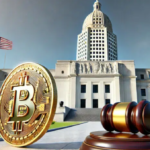Democratic Congressman Ro Khanna has become the first member of his party to publicly advocate for the U.S. government to hold Bitcoin as a strategic reserve asset. Speaking on the Unchained Podcast, Khanna argued that holding onto Bitcoin seized from illicit activities, rather than selling it back into the market, could offer long-term benefits.
Khanna, representing California’s 17th District, framed the idea as a bipartisan issue, asserting that Bitcoin has the potential to enhance the Federal Reserve’s reserves due to its appreciation potential. He also believes this move could strengthen the U.S.’s financial leadership on the global stage.
The congressman pointed out that most of the Bitcoins seized by U.S. authorities come from illegal operations and are typically auctioned off. Instead, Khanna suggests retaining these assets could provide the government with greater financial flexibility and a hedge against economic uncertainty.
Khanna is set to deliver a keynote address at a Bitcoin conference in Nashville, where he will share the stage with political figures such as former President Donald Trump and GOP candidate Vivek Ramaswamy. This appearance marks a significant shift for Democrats engaging with the cryptocurrency sector.
In comparing Bitcoin to traditional assets like gold, Khanna noted its advantages: lower storage costs and less vulnerability to foreign inflation. He emphasized that the U.S. should lead the way in this new asset class, establishing market rules and reaping its benefits.
Alongside his Bitcoin advocacy, Khanna has been actively working on improving cryptocurrency regulations. He co-sponsored the FIT 21 bill, which aims to balance regulatory oversight between the Commodity Futures Trading Commission (CFTC) and the Securities and Exchange Commission (SEC). The bill has garnered support from over 70 Democratic lawmakers, reflecting a growing interest in reshaping the party’s approach to crypto.
Khanna’s stance represents a shift from the Democratic Party’s historically cautious stance toward cryptocurrencies. His efforts to establish a Bitcoin reserve and reform regulations could play a pivotal role in the future of digital assets in the U.S. as the crypto landscape continues to evolve.









